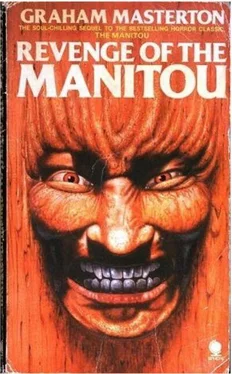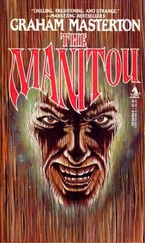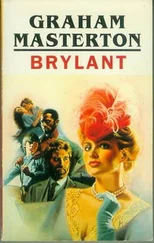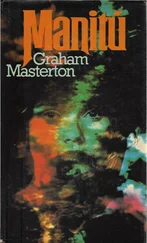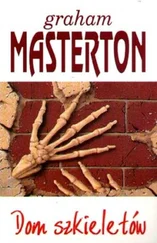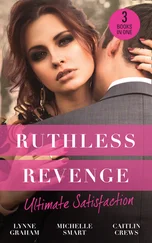“Lightning? We haven’t had an electric storm for weeks.”
“I know. But that’s what the neighbor said. The whole place was sent up like a bonfire. Poor old Billy, not having the use of his legs, was trapped in his living room.
Burned to death, black cat and all.”
Neil swallowed, and his throat was as dry as a nylon rug. The day seemed suddenly hot and oppressive, and the clank and clatter of boats’ rigging was like the tolling of toneless, funereal handbells.
Neil admitted, “I saw him only yesterday. I was talking to him, as close as we’re standing now.”
Doughty looked away, and puffed a couple of times at his pipe.
Neil said, “Did you find out anything else about it? Or was that all?”
Doughty turned around, and eyed him up and down. “All? What more do you want?
You know what they’ve always said in Napa County. Where there’s a Fenner, there’s a bad wind blowing.”
“What land of a saying is that?”
Doughty shrugged. “I’m not sure I know. But I guess it’s one of those sayings that’s based on experience.”
Neil stared at the blue-gray Pacific for a while, at the wavelets which lapped at the fishing boats and pleasure cruisers tied up at the jetty. Then he said, “Billy Ritchie talked about the old days, about the tunes when Bloody Fenner was still alive, and about the Indian massacres. He told me all about Ossadagowah, and some of the other Indian demons.”
Doughty took the stem of his pipe out of his mouth and spat a distance of ten feet into the water. “So what are you saying?” he asked. “You think he talked too much, and some of them Indian demons set ablaze to his house?”
Neil looked at him sharply. “It’s nothing to joke about, Doughty. Those demons are dangerous, just as much today as they were in the old days.”
“Neil,” growled Doughty, in his old sea-dog voice, “you’re letting yourself get out of hand.”
“You think so? What if I tell you I saw a ghost with my own eyes right out there on the bay? What if I tell you that one of the most powerful Red Indian medicine men who ever lived came alive in my house last night?”
Doughty thought about it, and then reached out and held Nell’s arm. “I know what you must be feeling, Neil. I know you’ve been working hard. Maybe you’re feeling even worse now, because of poor Billy going up in smoke. But you’re not going to make anything better if you keep on letting these ghoulies and ghosties scare you so much.”
Neil frowned. “Have you been talking to Susan?”
Doughty kept his eyes steady for a moment, then looked away.
“When did she come down here?” asked Neil.
Doughty shrugged. “Yesterday afternoon, while you was up in Calistoga.”
“And what did she say? That I was crazy?”
“Not at all,” insisted Doughty. “She said she was worried about you, that’s all, and she asked if you’d been working too hard on them boats. I told her no, you seemed fine to me. But she was still worried about some of the things you’d been saying, and some of the things you’d been thinking. She said you were acting like a man with something on his mind. She’s been thinking of getting you down to a shrink, I can tell you.”
Neil rubbed his face with the flat of his hand. “Do you think she’s right?” he asked Doughty. “Do you think I need analysis, too? Do you think I’m a head case?”
Doughty didn’t answer.
Neil said, “Well? Am I sane or insane? Am I dreaming or am I awake? Why don’t you tell me the way you feel?”
Doughty said uncomfortably, “It’s not for me to say, Neil.”
“But what the hell do you thinks’ going on here? Toby starts seeing ghosts in long white duster coats, the kids in his class start having nightmares about Indian massacres, and now Billy Ritchie gets himself killed in a freak fire, the day after he told me about redskin demons. None of this is normal, Doughty, but it’s happening for real, and it’s no use this town pretending it doesn’t exist.”
“Neil-” began Doughty. Then he changed his mind and shook his head.
“What were you going to say?
“Oh, dammit, Neil, you’ve got to realize you’re fighting yourself an uphill battle.
Everybody’s thinking you’ve lost your marbles. Don’t you think you’d be better off forgetting the whole business?”
Neil turned away in exasperation. But then, in a low, intent voice, he told Doughty,
“Listen-if I was like you, if I tried to pretend that nothing was happening, then this town would suffer the worst tragedy it’s ever known. It’s coming, Doughty, I warn you. It’s coming soon. I didn’t want to believe it myself, and even now I wish I'd never gotten myself mixed up in it. But it’s happening because of Bloody Fenner, my ancestor, and I don’t have any choice. If I don’t fight back, then you and me and Susan and Toby and thousands of people are going to die, and that’s all I know.”
“Neil-”
“That’s it, Doughty. No more advice. No more nothing. From now on, anybody who doesn’t believe me is against me, and that’s the way it has to be.”
He left Doughty sitting on the pickup’s bumper, and went down to the White Dove to collect his metal polish and cleaning rags.
In the middle of the night, with bluish moonlight irradiating the room, he woke up suddenly and lay silent, listening to Susan breathing beside him and Toby softly snoring in the cot across by the door. He must have stayed like that, unmoving and watchful, for almost ten minutes, for the brilliant edge of the moon slowly appeared in the corner of the window, and the light grew brighter and brighter.
A voice whispered, “Neil.”
He raised his head. There was nobody there. The moon glistened on the rails of the wide brass bed, and on the handles of the painted pine bureau, but even in the shadows behind the closet and in the alcove by the door, there were no apparitions, no ghosts in long white coats or clad in shiny wood.
The voice repeated, “Neil.”
He looked all around the room, straining his eyes, his heart beating quickly and irregularly. It was as still and silent as when he had first awakened.
“Where are you?” he whispered.
There was a pause, and then the voice said, “Beside you.”
He jerked his head around. Next to him, Susan was fast asleep, her blond hair spread on the pillow, her lips slightly parted.
“Where?” he asked. “I don’t see you.”
Susan’s lips moved almost imperceptibly, and a man’s voice spoke out of her throat.
“Here. Beside you. I can’t show myself because of Quamis.”
“Is Quamis here?”
“You bet. He’s inside your son. He’s like a moth inside of a chrysalis, and it won’t be long before he bursts out of there and spreads his wings.”
Neil breathed, “Who are you? What’s your name?” “You’ve seen me before. The name’s Dunbar. I was out of Sacramento in ‘31. I thought you was Alien at first, you looked so similar. The spitting image of Alien.”
“It was you in the beard and the long white duster?” “That’s right. In those days, there was me and nineteen others, and our wives, and all of our children. The Wappos took us by surprise up by Las Posadas, and killed us all. Alien was the scout on that trip, and went for help.”
Neil stared at Susan. She seemed to be more than asleep. Her breathing was slow and shallow, as if she was in a coma. The voice continued, “Alien went for help, but he didn’t get back in time. He said he was going to go for the Mexican camp down in the valley, make his way back up the creek. But he never came back. They cut us all down, the Wappos, women and children too, and I saw my dear little Margie with an arrow clean through her face.”
Читать дальше
